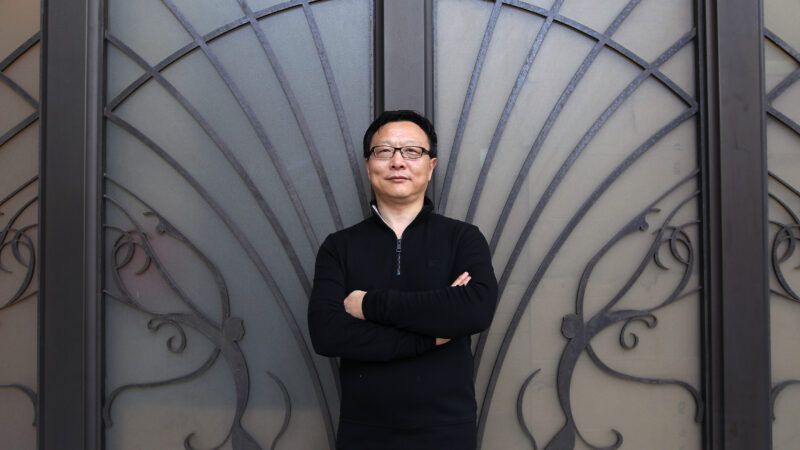Michigan Students Accuse Celebrated Music Professor of Racism for Screening Othello
Bright Sheng survived the Cultural Revolution. Or so he thought.

Bright Sheng is a professor of composition at the University of Michigan. He was born in China in 1955; when he was a child, the Red Guards took away his family piano. Nevertheless, he grew up to become a widely celebrated musician: He received a MacArthur "genius" Fellowship in 2001, and has twice been a runner-up for the Pulitzer Prize in music.
His undergraduate students should certainly count themselves lucky to be able to learn from him. Instead, they are demanding the university fire him for rendering the classroom an unsafe space. The administration is looking into the matter, and Sheng has stepped down from teaching the class for the time being. He has apologized profusely for making his students feel wronged, though many have loudly rejected his apology.
What was Sheng's transgression? He screened the 1965 version of Shakespeare's Othello in class as part of a lesson about how the play was adapted for the opera. This version stars Laurence Olivier, a white actor, who wore blackface to portray the protagonist Othello, a Moor. The choice was controversial even at the time, and today, the portrayal is considered by many to be akin to a racial caricature.
It's not clear whether Sheng, who was born and raised in China, understood blackface's specifically American legacy, and why such a portrayal is considered offensive. But he swiftly apologized for screening this version of the film.
"I thought (that) in most cases, the casting principle was based on the music quality of the singers," Sheng told The Michigan Daily. "Of course, time (sic) has changed, and I made a mistake in showing this film. It was insensitive of me, and I am very sorry."
His apology ought to have been more than sufficient, but his students were not appeased. Indeed, they reacted as if they had been traumatized by the experience.
"In such a school that preaches diversity and making sure that they understand the history of POC (people of color) in America, I was shocked that (Sheng) would show something like this in something that's supposed to be a safe space," one student told the Daily.
Other students signed an open letter calling on Sheng to be removed from his teaching position for failing to "create a safe environment." Their letter laments that such a thing could have happened, even though 100 percent of professors are required to take diversity training.
One of Sheng's colleagues, Evan Chambers, another professor of composition, sided with the students and accused Sheng of committing a "racist act."
"To show the film now, especially without substantial framing, content advisory and a focus on its inherent racism is in itself a racist act, regardless of the professor's intentions," said Chambers. "We need to acknowledge that as a community."
Sheng willingly admitted that screening the film was a mistake, but bristled at being labeled a racist. In his apology, he noted that he had repeatedly cast people of color for leading roles in his work and "never thought (of himself as) being discriminating against any race."
But his protestations that he is not a racist only further enraged the students.
"Professor Sheng responded to these events by crafting an inflammatory 'apology' letter to the department's students in which he chose to defend himself by listing all of the BIPOC individuals who he has helped or befriended throughout his career," wrote a group of concerned composition students including eight undergraduates, 15 graduate students, and nine staff and faculty members, according to the Daily. "The letter implies that it is thanks to him that many of them have achieved success in their careers."
The graduate students also told the Daily that they were reaching out to the undergraduates to make sure that they felt supported and safe. "What can we do to help the undergraduates? What do they need?" said one. "Clearly they're not going to be in a room with (Sheng) anytime soon."
I'm including so many of the quotes from this student newspaper article in order to make clear that this was not just one or two irate outliers: A significant number of Sheng's students, former students, and colleagues have denounced him as a racist. And the administration is taking the matter seriously: The music department released a statement saying that "Sheng's actions do not align with our School's commitment to anti-racist action, diversity, equity and inclusion." The university's Office of Equity, Civil Rights, and Title IX has received a complaint about the incident.
The University of Michigan is a public institution at which students and professors deserve free speech and expression rights. It is a violation of the university's cherished principles of academic freedom to punish Sheng for the choices he makes in the classroom. Screening a racially problematic film in an educational setting is neither a racist act nor an endorsement of racism. At this point, it is Sheng who is owed an apology from the broader university community for falsely maligning him.
Imagine surviving the Cultural Revolution in communist China, only to reencounter it on an American university campus in 2021.
